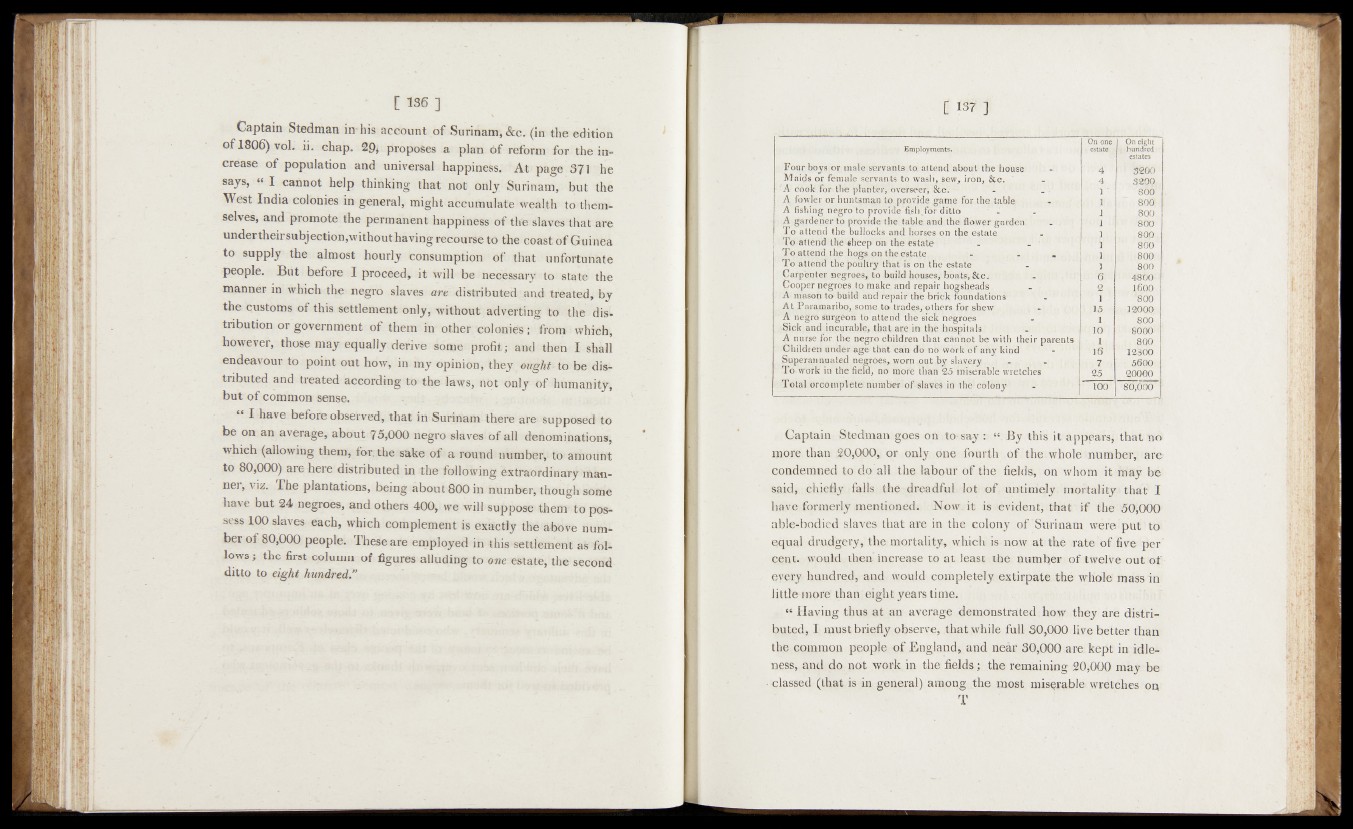
Captain Steelman in-his account of Surinam, &c. (in the edition
of 1806) vol. m ehap. 29* proposes a plan bf reform for the increase
of population and universal happiness. At page S71 he
says, “ I cannot help thinking that not only Surinam, but the
West India colonies in general, might accumulate wealth to themselves,
and promote the permanent happiness of the slaves that are
undertheir subjection,without having recourse to the coast of Guinea
to supply the almost hourly consumption of that unfortunate
people. But before 1 proceed* it will be necessary to state the
manner in which the negro slaves art distributed-and treated, by
the customs of this settlement only, without adverting to the distribution
or government o f them in other colonies; from which,
however, those may equally.derive some profit; and then I shall
endeavour to point ont how* in my opinion, they mght- to be distributed
and treated according to the laws, not only of humanity,
but of common sense.
“ I have before observed, that in Surinam there are supposed to
be on an average, about 75,000 negro slaves of all denominations,
which (allowing diem, for. the sake of a round number* tb amount
to 80,000) are here distributed in the following extraordinary manner,
viz. The plantations, being about 800 in number, though some
have but 24 negroes, and others 400, we will suppose them- to possess
100 slaves each, which complement is exactly the above number
of 80,000 people. These are employed in this settlement afe fbfc.
lows; the first column of figures alluding to one estate, the second
ditto to eight hundred
bn one .On eight
Employments;; ^; ( estate .% (hundred
estates
FQt)r,boys,or male servantssto, attend about the house 4 ! 32ÓÓ
Mai$s or female servants to wash, sew, iron, &c. _ . . 4 1 3200.
WH cook* for- thfe plan#iv,■ oVePseer; ’Sec’.''-- - ‘ 5: 1 ‘ 800
A fowler or huntsman to.pfavi^e.gamq fonth.4;table - ■ »f ' f | 800'
A fishing negro'to provide fishjor ditto' - ' . J 800
A gardener to provide the.-table and the flower garden IHUi ll| 800
To attend the bullockjs and. hor|es gel the estate , . ] ■ .§00«
To attendHhe«heep bb the estate *0™® . - 1 JW é ■
Tq attend the hogs, on the,estate , . ||§§§jj 2 ;t8Q0it
To attend' the poultry "that’ is' on.uie estate" ' . ] 800
Carpenter negroes,'to build houses,» boats, &c. m ■
Cooper negroes to make and repair hogsheads WÈËmi l& O 'l
:fA» mason to» build« afid' repaiPthe brick roundations- - " ' ® Y *' ’ “*§00
, AfParamaribq^ptn.e.,tq.i.tr.^des^others focshew?.. A.,,.,' ‘ a.*s j . is. c
i.
i»(iI20QQ/(
A negro slirgCon to at ten cftnesi c t negroes1“ 800 ,
.-,§ick and inpqrable, that ai?e in? the hospitals J J . ; . ; !"‘8b00J^
A nurse for the negro children that cannot be with their parents • ; 8.(|0 •
ylOhildteW aydepiage th^t cab do no'%otlW~^y kind iff'
o u t b y l
To-work in the field, no'mofe than 25 miserable wretches V 2? , ^0060
®ffhtaLWrdom;p:teterTahmherioTslaVe|'iy-ihwl.cfMniwjgfi | 1 .1 , '8uj®30!!!
Captain Stedtoaan goes on »to say : “.By this it/apppavs, that no
more, than 20,000,. or only one fourth tof the-whofei: number, are-
condemned to do all the labour of the fields, on whom it may bé
said* chiefly untimely mortality ; that I
have formerly mentioned: ’ 'Now-it is ^evident, that' if the iiSOlOOO*
able-bodied slaves: that are in the colony .of’Surinam wéfe 'puCtbi
equal drudgery* tlm mortality, whichiis- now afc thé rate of five: per
cent, would then increase tb at. least the number ofctwelve out of
every hundred, and would completely extirpate the whole mass in
little more than eight years time:,
“ Having thus at an average ,demonstrated;how-jtbey are distributed,
I must brieflyohserfe, thatwhile.l^l 50,000 live beifeteB than
the common people of England*;and near 30,000 are, kept in idleness,
and do not work in thei.fiejds; the remaining 20,000 may be
classed (that is-in general) araongjhe most miserable wretches on
|